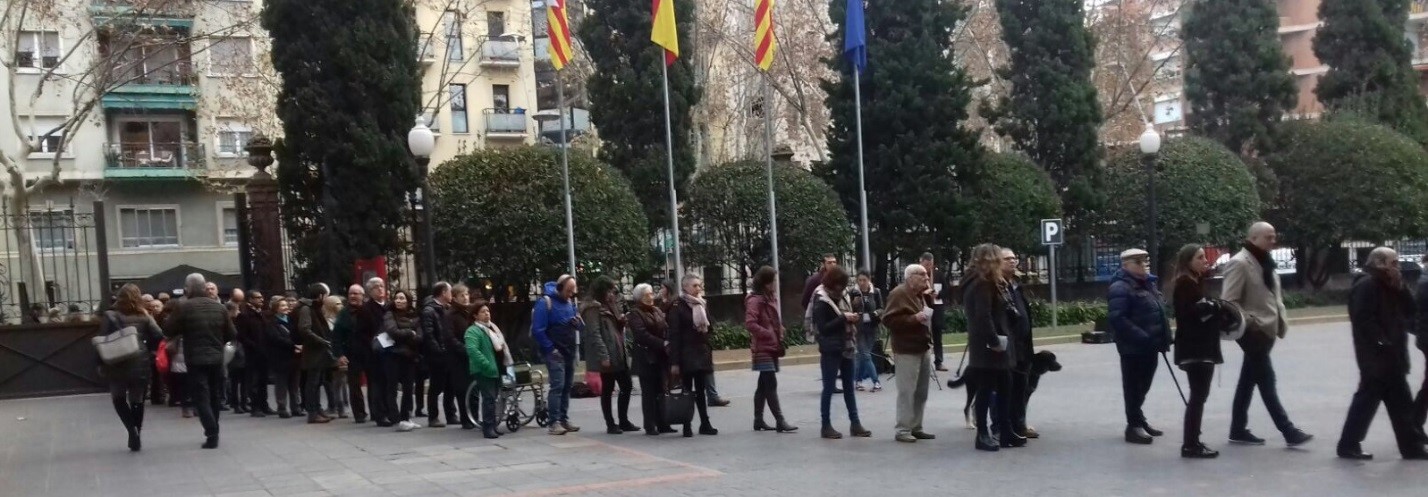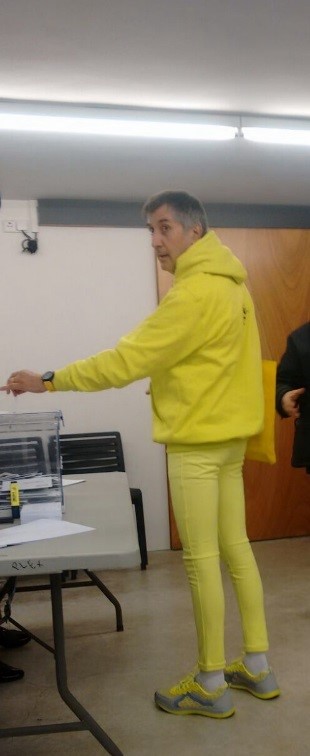Bayla Ostrach
December 25, 2017
This article updates the author’s previous analysis of the October 1 Catalan self-determination referendum and its aftermath: Catalunya: Together We Build the Republic.
 Catalan voters queue to vote on December 21st in Barcelona. Photo distributed by author’s comrades during election day.
Catalan voters queue to vote on December 21st in Barcelona. Photo distributed by author’s comrades during election day.Amidst a Coup, Catalans reconfirm support for Left, Independentist Majority
On December 21st, 2017, a record number of voters in Catalunya turned out for special midterm parliamentary elections, imposed on the region by Spanish Prime Minister Mariano Rajoy as part of the Article 155 coup following a self-determination referendum on October 1st.
Despite the lingering memory of Spanish military police beating hundreds of peacefully assembled voters scarcely more than six weeks earlier and jailing their democratically elected leaders, an unprecedented 82% of people nevertheless voted. The coalition of independentist parties made up of Junts pel Catalunya (JxCAT) , Esquerra Unida (ERC), and the Candidatura d’Unitat Popular (CUP) reconfirmed an absolute majority of seats in the Catalan parliament, with 70 seats to the far-right coalition’s 57; and more than 2 million votes to the far-right coalition’s 1.87 million. En Comú Podem took the remaining 8 seats of the total 135 seats in the Catalan Parliament. They are not considered part of the left coalition’s absolute majority. But as a party newly formed since the 2015 regional elections and led by activists close to the CUP, a Catalan Green Party, and other left alternative parties, its MPs are likely to vote with the ERC/Junts/CUP bloc.
Voting proceeded peacefully, though with some reports of voters who wore yellow ribbons or other known markers of support for the independentist political prisoners not being allowed to vote. Other voters found creative ways to resist. (See photos below shared by author’s comrades).

Though the outright victory of the independentist coalition is seen as a refutation of the Spanish Prime Minister’s attempt to suppress Catalan self-determination efforts, the unexpected gains in particular of Ciutadans, especially in Barcelona, are nevertheless troubling. Ciutadans is the Catalan counterpart of a larger Spanish party, Ciudadanos; both known, like Mariano Rajoy’s Partido Popular (PP) for far-right (some say neo-fascist) rhetoric, anti-immigrant efforts, and anti-woman stances.

Ciutadans/Ciudadanos’ mirror but often go farther even than Rajoy’s conservative postures and proposals. Ciutadans had not gained such widespread support in Catalunya before now, but on December 21st shockingly won the greatest number of overall votes for a single party, and the largest bloc of seats for a single party — largely on the strength of votes from Barcelona. While the far-right, anti-independentist bloc won 57 seats in the
Catalan parliament overall, fully 37 of those went to Ciutadans.
Most analyses by both comrades on the ground and among credible European press sources interpret Ciutadans’ gains as votes taken away from the PP, and, according to one article, the Socialists – these voters moved (farther) to the right. As an activist friend (who teaches at my daughter’s old school) said, “hard work ahead.” Another wrote, with much agreement by comrades in our group text, “in these imposed elections [people] only voted [for the new self-determined] Republic or [for Article] 155 [under which Spain revoked Catalan autonomy], separate from lefists, rightists, and above all, ultra-rightists.” The concern that the coup-imposed election forced a vote driven purely by political rather than class concerns is echoed by other comrades particularly alarmed by electoral maps of the city of Barcelona itself.
Early analyses indicate that in some of Barcelona’s poorest neighborhoods and suburbs voting by young people, first-generation Catalans from immigrant families, and precarious workers shifted these districts from what used to be majority Esquerra or majority Socialist to Ciutadans. Much of what people from these neighborhoods, or similar ones nearby, wrote and posted about the voting results to me echoed ‘the Trump effect’ in the 2016 elections, with voters acting against their own class interests in the belief that a more conservative party could save them from financial precarity.
An anarchist historian in the group had a telling take on the situation, “We need to make the Republican project attractive (even) to the exhausted working class mistreated by the neoliberal policies of the right and the armchair social democrats.” Others were reassured by strong showings from ERC (the traditionally left/labor party that has become increasingly independentist) and steady support for the CUP:
Leftist independentism has penetrated (reached) strongly into metropolitan areas. Esquerra is the second strongest… in [three large working-class towns just outside of Barcelona]. And the CUP, even with low results, these are distributed with strong uniformity across the territory [region], like ERC.
What is now unknown is whether the Spanish coup will be lifted, and if/how the newly re-elected majority independentist Catalan government will be allowed to take power, and actually serve. If Rajoy thought that removing the previous democratic government and forcing new elections would defuse the independentist movement, he seems to have been sorely mistaken – but what exactly will happen next, is also unclear.
Bayla Ostrach is a member of Solidarity and a medical anthropologist who conducts ongoing fieldwork in the Catalan Republic. Her article on Catalunya will appear in the forthcoming Against the Current. She is the author of Health Policy in a Time of Crisis: Abortion, Austerity, and Access (2017), based on earlier research in Catalunya.
